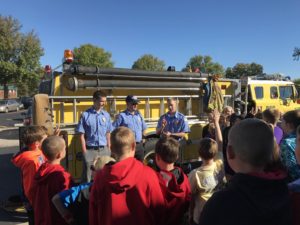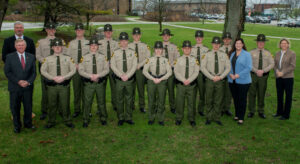Short Story Saturday: The Revival

In the summer of 1965 a flier appeared in the window of Web’s Grocery. It was bright orange with bold black words announcing the arrival of Reverend Paul Childers and his Hallelujah Crusaders. The fairgrounds would host the event: the dates, August 13th through 15th. I had never attended a revival and would’ve paid no mind to this particular flier were it not for the sketch of the circus tent, the profile of Reverend Childers, and the Hallelujah Crusaders hovering in the background as if they had everyone descended from heaven.
With Uncle Clyde and Aunt Sylvia in Front Royal for the day, Mamaw Cullum and I had caught a ride into town with Reginald Kincaid. Mr. Kincaid was a retired congressman. A man of gentility, he spoke often of the special interests inherent in the Capitol. He called them the engine that powered the gears of Congress. Like Mamaw Cullum, he had spent the previous ten years of his life widowed, content in his solitude. But then a change occurred, an unseen force that seemed to inspire in Mr. Kincaid a certain flowering of affection. This I inferred by way of his frequent phone calls and offers of assistance. Like his friendly gesture to serve as chauffeur for my elderly grandmother, who had long since given up driving even though a perfectly tuned and gleaming relic of the past sat permanently retired in her barn. Perhaps solitude had become a burden to him. I didn’t know. But whatever the reason, when Mr. Kincaid phoned to say he was destined for Bray’s Home and Garden, Mamaw Cullum responded that a ride to the grocery would be most welcome.
The journey to town was uneventful, and Mamaw Cullum and I soon found ourselves at the corner of Main and Depot with the understanding that Mr. Kincaid would return in an hour to pick us up. Knowing full well of Mamaw Cullum’s frugality and the comparative nature with which she shopped, I figured an hour would place her somewhere between the checkout stand and the automatic doors up front. I chose to spend this time at Woolworth’s, directly across Main Street and the only establishment in town that sold records. The rack of 45s was extensive and arranged in numerical order: Top 40, the sign above the rack said. Luckily, the music department was located in a rear corner of the store. Since Mamaw Cullum was not a fan of rock ’n roll I saw no reason to worry that she might discover me back there. But as a precaution, I hatched a plan that should she finish early and come looking for me, I would duck walk two aisles over and reappear in the shoe department admiring penny loafers and cotton dress socks.
Unlike The Hop Shop in my hometown of Holly Springs, Woolworth’s was not equipped with a sound booth. This forced me to play the songs in my head, which wasn’t hard given the amount of time I had spent glued to the radio during those early years of my life. After much deliberation I narrowed the choices to three. I played each of the three melodies again in my mind until finally, I settled on Silhouettes by Herman’s Hermits. Drifting toward the front register I grabbed a T-shirt to conceal Herman from Mamaw Cullum. No sense working her into a fit; the strain on her heart and on my ears wasn’t worth it. I paid the cashier and returned to the sidewalk in front of Web’s. A short while later Mamaw Cullum exited the grocery. She pushed the shopping cart to a standstill alongside the orange-and-black flier, maneuvered her face as close to the window as she could get, and studied the announcement. I could almost see the idea form as she absorbed each word. When she finished, she turned to me and with an orange hue reflected in her glasses said,
“Steven, how would you like to go to a revival next month?”
This was a question that had never before been posed to me. But feeling adventurous, and also partial to old-time gospel music, which, I had read, was the foundation for rhythm and blues, I said okay. Mamaw Cullum seemed pleased with my response, and while we waited for Mr. Kincaid to return and deliver us home she was the picture of happiness, humming Amazing Grace and smiling gently whenever we locked eyes.
Later, I thought it odd how easily Mamaw Cullum had fallen for the flier. Normally she gave little heed to evangelists, and especially faith healers. Once she even expressed what can only be described as scorn for a tiny little preacher from Georgia who compared himself to David; he told his congregation that the evil of the world represented Goliath, and that with their generosity he was going to conquer it all and set things right. But since I had recently turned fourteen, I decided that Mamaw Cullum must’ve figured the time was right for Satan to point his wicked finger and direct my attention to all he had to offer. She often opined that the threat of sin necessitated a counter balance, and apparently the Lord, in his infinite wisdom, had seen fit to provide her one in the form of Reverend Childers and the Hallelujah Crusaders. If the good Reverend wasn’t fully able to absolve me of sin, I assumed Mamaw Cullum hoped he would at least point me toward the pathway of righteousness.
My parents were the reason I traveled to McAlester every summer. From the age of eight and at the end of each school year they packed me onto a train with Mamaw Cullum and shipped the both of us north. Whereas Mamaw Cullum chose this routine year after year—after all, McAlester was her birthplace—I was brainwashed into going. They referred to those summer months as my golden opportunity, the chance to vacation in Virginia’s beautiful Shenandoah Valley. I believed this line of reasoning until the age of twelve, when I realized what my parents meant to say was that it was their golden opportunity, a few months of tranquility uninterrupted by Mamaw Cullum’s sermonizing and the distractions of an inquisitive child underfoot.
In the same way that Labor Day falls on the first Monday of September, departure day for Mamaw Cullum and me fell always on the first Thursday of June: the journey from Holly Springs to McAlester took the better part of a day and a half to complete, and since Mamaw Cullum attended church every Sunday and Wednesday without fail, and also insisted that a woman her age required a full day’s rest to recover from the agony of such a trip, Thursday and Friday were the only days of the week we could travel. Mamaw Cullum never wavered on this point.
After arriving at the station I would hurry to unload the car while my parents reminded Mamaw Cullum to always keep me in sight. Satisfied that she would monitor my every move, my parents handed her a slip of paper—a set of guidelines as it were—for raising the type of child I was into the type of adult they expected me to become. I still have, in the back of a drawer somewhere, the yellowed piece of paper containing my parents’ priorities for my growing up. I suspect that my father composed the details at my mother’s request. Simply put, he had drawn a pyramid and divided it into four sections. The lowermost section he labeled as yard work, schoolwork, good behavior, and respect for others. The middle sections contained such listings as religion, friends, and recreation. The top section consisted of only one word: television. This handing over of instructions was a yearly ritual, and though Mamaw Cullum had her own ideas for raising a child, a pyramid in which the bottom section was devoted entirely to avoiding sin and abiding strictly to the word of God, she accepted them without complaint. But each time we boarded the train she conveniently disposed of my parents’ instructions in the bottom of her purse.
Of the many images I have of Mamaw Cullum the most vivid is the manner in which she carried her purse. She did not carry it like most women, dangling from a shoulder or a forearm as if it had little value. She clutched it tightly at all times, guarding not against the theft of what minimal amount of money it contained, but rather to protect the objects that rendered it less of a purse and more of a first-aid kit for administering religion to folks she believed were sprawled on the tarmac of holy indifference. Along with a seemingly endless supply of bookmarks emblazoned with the Ten Commandments, she carried a vial of consecrated water, a flask of red wine, a sufficient number of silver-dollar-sized wafers, a change purse bulging with tiny metal crosses, and three or four miniature versions of Gideon’s New Testament, which she distributed to those she decided were most critically in need of such help. Though Mamaw Cullum always prepared for the worst, she also realized, probably better than anyone else, that sin could take the most innocent of forms—and the more innocent the form the more powerful the effect.
While records fit this description perfectly, there were other, equally effective “instruments of evil” she deemed inappropriate to the Christian lifestyle. My transistor radio fell into this category. She complained that the stations I listened to were Satan-owned-and-operated, and that the deejays who broadcast from these facilities were nothing more than co-conspirators participating in what she called an abuse of the public airwaves. She once said, of the deejays she most despised, “Those no account degenerates were hired for only one purpose, Steven, to corrupt young minds like your own.” She also believed that the musicians responsible for such despicable music, as she called it, were lieutenants appointed by the Devil himself, sent across the country and the Earth to lure those of us too naive to know better into the legions of the underworld.
There were, of course, other, less serious transgressions of which I was also guilty; transgressions which Mamaw Cullum herself could redeem. Sins such as laziness, dishonesty, or insolence she considered minor infringements on the Gospel of the Lord; too minor, in fact, to require the services of an evangelist. These she controlled with a lecture, or, if necessary, the threat of a belt. Others, however, were far beyond her expertise. Of these Elvis Presley was king. He represented all that Mamaw Cullum disdained. Jailhouse Rock, Blue Suede Shoes and Heartbreak Hotel were at the top of her hate list. And on more than one occasion she warned that he was the Pied Piper of my childhood. “To follow in his path,” she said, “is to follow the highway to hell.” Though I never said so to Mamaw Cullum, if hell was where one found the sort of girls attracted to Elvis Presley then to hell I was headed. Some while later I realized dancing would play a vital role if my journey was to reach a successful conclusion. I also realized I needed someone to teach me the moves. Eventually, Veta came to mind, not only because she loved to dance but also because she was a natural at it. Plus, I knew she wouldn’t make fun of the way I floundered about.
As close as I could tell Veta was in her mid-twenties at that time. Never formally adopted she had lived with Uncle Clyde and Aunt Sylvia for nearly two decades. There were no documents to establish her age, or even the identity of her parents for that matter. According to Uncle Clyde, Veta’s arrival at the orphanage was a common one during the 40s. Like many abandoned children of that era she arrived at the county home little more than a ball of dirt, a malnourished girl with a bundle of clothing tied to a stick and a note pinned to her lapel pleading for mercy. She was taken in and given food and shelter, but her troubles were far from over. Labeled odd and unintelligent—Veta’s mental capacity never exceeded that of a five-year old—the other children treated her cruelly. I imagine it was out of pity more than anything else that led Uncle Clyde and Aunt Sylvia to accept her as a foster child. But it wasn’t out of pity that they grew to love her. Over the years Veta transformed the emotional pain she endured as a child into compassion and kindness. By the time I got to know her I doubted there was anyone she disliked. And as a tribute to her gentle nature I never heard a bad word spoken of her.
Occasionally, though, anger got the better of her. And when it did her face turned bright red and she took on the appearance of a human pressure cooker. She fought hard to internalize her emotions. I assumed her mastery of self-control resulted from her childhood and the time she spent in the county home; children have a habit of intensifying their cruelty when they see its effects taking hold, and Veta probably understood this fact all too well and employed indifference as her primary mechanism of defense. But she wasn’t always successful. Her inability to perform some simple task or another proved the most common trigger to set her off. But the thing she hated most was her forgetfulness. Whenever she realized her memory had forsaken her she retired immediately to the porch and sat in the rocker, where she dipped snuff with a faraway look in her eyes and propelled herself back and forth as though life itself would stop when she stopped. Afterward, if it wasn’t already too late, she took care of whatever it was she had forgotten.
I often wondered if Veta derived any enjoyment from life. Except for the times we danced it was impossible to tell. Her face was like a plaster cast of drudgery for days on end; her eyes seemed to harbor a deep and impenetrable sadness, and smiles were as foreign to her as Scripture to an atheist. But whenever Elvis or Ray Charles or anyone else of their caliber leapt from my tiny red radio, there was no denying her pleasure. When Veta danced she seemed the center of gravity around which the world revolved; though most of the time she had no idea of the lyrics or even what they meant, she didn’t seem to care. It was the music itself, the beat of it and the raw intensity of it on which she thrived.
I discovered Veta’s ability to dance by accident. It occurred in August of ’64, the year before Reverend Childers’ flier appeared in the window of Web’s Grocery. Mr. Kincaid’s son and daughter-in-law, Daniel and Melanie, had driven up to spend a long weekend in McAlester. Daniel was an attorney, like his father, while Melanie taught music at Rawley High School in Oberlin, Georgia. I had also heard she was a church pianist and talented soprano.
On Saturday, Aunt Sylvia extended the Kincaids an invitation to join us at the McAlester Baptist bimonthly cakewalk. It was the only time Mamaw Cullum ever won anything, and the German Chocolate cake she carried home that day she bragged about for the rest of her life. After receiving her prized cake we returned to Mr. Kincaid’s to relieve her of the burden of having to eat it alone. With the cake rendered to crumbs and the second pot of coffee percolating on the gas range, Melanie seated herself at the piano, folded the lid back to expose the keys, and began to play. The sound rose smooth as varnished wood and drifted through the open windows and screen doors. As if on cue, the purple twilight that had settled over the yard glowed with the yellow-green flicker of fireflies like they were born of the notes she played. I leaned back on the couch, eyes closed, ears tuned to Melanie’s sweet music.
A while later I realized Veta had disappeared. I assumed she had wandered off to the back porch to dip snuff. Besides being the most polite person I had ever known she was also extremely timid. She could never have brought herself to ask permission to dip snuff in a strange house. I excused myself and went to look for her. As I approached the back door I glimpsed her gliding across the floor serenaded by Melanie’s agile fingers and lilting voice. Around the rocking chairs and swing she danced as if buoyed by the warm summer eve and the gentle music. Initially, she failed to notice my presence. But soon as she saw me through the screen door the dancing stopped. She sat in the swing and pulled the small, round can from her shirt pocket. I sat in a rocker and watched her dip.
“Where did you learn to dance like that, Veta?” I asked.
“I reckon I seen it on television,” she said.
The rest of the evening Veta and I sat together on the porch, and whenever Melanie engaged us with a song we pushed ourselves in motion and let our thoughts trail off across the darkening fields. The following Thursday
Mamaw Cullum and I returned to Holly Springs.
I entered the eighth grade that September, and, for the first time in my life, I suddenly found girls more attractive than sports. This presented a problem. The mere thought of talking to girls sent me hurtling into a state from which I could not produce words, and though comforted by the knowledge that some girls were attracted to shyness even that failed to inspire in me the ability to speak. Every time I attempted to converse with a girl, and believe me I tried on more occasions than I care to recall, I achieved nothing if not to sound like the most incoherent person on the face of the Earth. My brain, as evidenced by my tongue, simply refused to function. I decided to redirect my energy toward sports in the hope that my inability to speak to girls would soon correct itself.
As Halloween approached talk of a school dance began to circulate through the hallways. This intrigued me. Loud music meant that conversation would be restricted if not altogether absent. Naturally I surmised that a dance would be a good place to overcome my fear of girls. If I could dance with a girl then surely by the end of the evening I would be able to speak to one. The day the Halloween dance was confirmed I rushed straight home from school, locked myself in the bedroom and turned on the radio. Within an hour I realized my problem wasn’t confined to speech. Regardless of the way I threw myself about the room, I was simply unable to produce the necessary movements associated with popular dance.
I concluded that for the time being girls were out of my league. Afternoons I spent playing basketball, or football. In the evenings, after completing homework assignments, I spent an hour or so reading the dictionary: I had developed a theory that by expanding my vocabulary it would only be a matter of months before I could stroll up to the girl of my choice and impress her with a repertoire of fanciful words and phrases. It was all to no avail. Whenever an unsuspecting girl did endeavor to ask me a question, if I managed a coherent answer at all it was the wrong response.
Basketball season carried into baseball season. I gave up all hope of conversing with girls and returned to the notion that I had to somehow learn to dance. I had proven I couldn’t talk to girls. What I hadn’t proven was whether I could dance with them. I had nightmares that when the time finally arrived and I stood facing a girl, her hand in mine, my body would forget all it had learned and flail about, completely out of control like my tongue. Still, convinced that dancing was my only option, I practiced relentlessly.
Toward the end of April something began to gnaw at me, an idea I couldn’t quite grasp but sensed was the answer to my problem. The week before summer recess it hit me; I would enlist Veta as my dance instructor. Veta I could talk to. If she could perform the mashed potato by seeing it on television, then between her and American Bandstand nothing should prevent me from learning to dance.
As soon as Mamaw Cullum and I emerged from the train in McAlester I went looking for Veta to present my plan. I found her behind the barn waist deep in a herd of goats. I waited until the goats were milked and then followed her into the barn. The moment I’d agonized over had arrived, and quite unexpectedly, possibly due to the seriousness of the question I was about to ask, the sickening wave of incoherence began to wash over me. I forced myself to calm down and then somewhat tentatively said, “Veta, I was wondering if you might do me a favor.”
“I reckon I might,” she said, reaching for a bag of chicken feed. “What kind of favor?”
“Do you suppose you could teach me to dance?” I stammered.
Veta released her grip on the chicken feed and left it sitting on the shelf. She turned slowly around and looked at me as if I had proposed marriage.
“In my whole life ain’t nobody ever asked me to teach them nothing,” she said. “I don’t know if I can or not.”
“Will you at least try?” I pleaded.
“I reckon I can,” she said. “If that’s what you want, I reckon I can.”
We went over the schedule and the location, and then I made her promise to tell not a soul that I didn’t know how to dance; there is something about a person in misery that attracts a crowd, and this I wanted to avoid at all cost. I raced to the house and explained to Aunt Sylvia that Veta had agreed to assist me, although I purposely misled her into thinking that I was the instructor and Veta the student. Since there was no chance that Mamaw Cullum would approve of our behavior, Aunt Sylvia promised to serve as our lookout should she appear unannounced.
From the second week of June until the middle of July Veta and I confined ourselves to Aunt Sylvia’s basement every Saturday afternoon. Veta was sensational. Whereas some people can hear a song and within minutes produce it on an instrument, Veta could just as quickly mimic a dance step. I wasn’t nearly as successful. But I forced myself to keep at it until I finally became a reasonably accomplished dancer, at least accomplished enough that I no longer feared stepping onto a dance floor.
The only problem we encountered was that Mamaw Cullum discovered our Saturday afternoon dance sessions. At first she saw no harm in them, mainly because I convinced her that we were dancing to the tunes of Lawrence Welk and Benny Goodman. But when she appeared unexpectedly one afternoon and heard Little Richard blaring from the television and saw the gyrations and the euphoria that had overtaken us, she nearly exploded. Having spent her life immersed in the Bible she quickly recognized another opportunity to practice what she had read. She was unrelenting in her indignation of rock ’n roll.
“If Elvis Presley is the Devil then Dick Clark is his advocate,” she said. “And don’t you ever forget, Steven, the Bible warns us to be not overcome with evil.” On and on she went quoting Scripture right up until the day we stood in front of Web’s Grocery, me admiring Reverend Childers’ artwork and Mamaw Cullum admiring the Reverend Childers himself.
The day of the revival I awoke with some uncertainty over what I had agreed to. A dense fog had settled across McAlester sometime during the night, and looking beyond my window at the gray mist suspended above the yard and dripping silently from the smokehouse eaves, I couldn’t help but think it an omen that my willingness to accompany Mamaw Cullum to the revival was a decision I might long regret. I actually had visions of my aging grandmother dragging me onstage, her eyes wide and unblinking and her body possessed with the strength and determination of some dozen Catholic nuns. The extent to which a faith healer could heal was unclear to me. Was it possible for Reverend Childers to place his hands on my head, recite an appropriate passage from the Bible, and then summon the Lord to instill in him the power to exorcise me of all that Satan embodied, but mainly the ability to dance and to enjoy the music I loved? Suddenly the girls of Belleview Junior High were nowhere to be seen; Mamaw Cullum, Reverend Childers and the Hallelujah Crusaders had replaced them.
Soon after lunch I saw Mr. Kincaid coming up the road. He often took an afternoon stroll which he claimed helped him digest food more effectively. Aunt Sylvia said it was an excuse to invite himself over for a slice of her famous strawberry-rhubarb pie, or her chocolate pound cake. Sure enough he followed the road until he got to the footpath that crossed the back lot. I watched him turn onto the winding strip of red dirt and then joined him. Together we walked next door.
Though she wasn’t as famous for her apple pie that’s all Aunt Sylvia had so that’s what she served. The conversation started with the usual subjects: family matters, the weather and life in general over the past week. It soon, however, shifted to Reverend Childers.
“Well, Steve,” said Mr. Kincaid, “I hear you’re going to the revival up at the fairgrounds tonight.” My first thought was that Mr. Kincaid and Mamaw Cullum had conspired against me. What with Mr. Kincaid serving as a church deacon, I assumed his familiarity with the process of casting off demons would be of great benefit to Mamaw Cullum in her desire to cleanse my spirit.
“Yes sir,” I said, “Mamaw Cullum rarely misses a chance to worship God.” Since I believed Mr. Kincaid in league with the enemy I felt it important to steer the conversation away from myself. No reason for him to know I was only interested in the music. I started to tell him about the time Mamaw Cullum chastised a railroad conductor for interrupting her Bible meditation session. He had merely asked to collect our tickets. Instead he got a wave of the hand and a question that required no answer, “Can’t you see I’m busy?” said Mamaw Cullum. “You run along and stop by on your way back. I’ll have the tickets for you then.”
The funny thing was that Mamaw Cullum never actually read the Bible while traveling. She claimed the constant motion and clatter of the passing tracks diverted her concentration. “The word of God,” she often said, “was meant to be read aloud in a peaceful and quiet environment.” So to appease her unwavering dedication to the Lord while trapped in a rail car full of sinners, who included anyone she didn’t for a fact know to be a firm believer and practitioner of the Christian lifestyle, she often sat with the Bible open on her lap as though the Scripture might somehow rise through the air and enter her soul like some sort of spiritual osmosis. But before I could begin the story, Mr. Kincaid spoke first.
“It’s been my experience that many young people such as you, Steve, aren’t too keen on the idea of religion,” he said. “Wouldn’t you agree Sylvia?” Whatever he was leading to I didn’t know. But that wasn’t what I wanted to hear.
“Ain’t that the truth?” said Aunt Sylvia. “Why, Momma McCorkle was the spiritual light of my youth.” Aunt Sylvia paused for a moment and then added, “You remember Momma McCorkle—don’t you—Reginald?” Mr. Kincaid nodded in agreement. When he finished, Aunt Sylvia said, “She had a switch called the staff of divine intervention that she hung faithfully above the mantel. And I promise you one thing, if Momma McCorkle couldn’t persuade us kids to rise early of a Sunday morning, her staff most surely could.” Aunt Sylvia and Mr. Kincaid laughed. Veta looked straight at me and said, “Hallelujah,” as if she, too, recalled the indelible mark of physical persuasion upon her childhood.
“Well, either way, I’m sure your grandmother’s proud of you, Steve,” said Mr. Kincaid. “And as much as you enjoy music there’s no doubt you’ll find this evening a pleasurable experience. I was up there myself last night and I assure you those Hallelujah Crusaders certainly know how to inspire a person to worship.”
That was all I needed to hear. The combination of Aunt Sylvia’s apple pie, the comfort of her porch swing, and the statement by Mr. Kincaid that I was in for an enjoyable evening washed away all my trepidation.
By the time we were to leave for the fairgrounds the weather had changed from pleasant to ominous. Great black clouds stretched off toward the horizon, while those directly overhead, whipped by the wind, seemed to boil in anticipation of what was to come. Mamaw Cullum and Aunt Sylvia led the way down the porch steps while Veta and I trailed solemnly behind. Nearly to the car Mamaw Cullum turned suddenly around causing the whole procession of us to stop in our tracks.
“Sylvia,” she said, “can you believe these two are going out in weather like this unprepared?” She glared first at
Veta and then at me like neither one of us had sense enough to breathe. I knew what she meant, but in the rush to get ready the weather had never entered my mind.
“What should we do with them?” asked Aunt Sylvia.
“I suppose they could stay here,” said Mamaw Cullum, “but there’s no telling what kind of mischief they’d get into while we’re gone. No, we’d better take them along. But not until Steven marches right back in that house and gets him and Veta a raincoat. Steven, do you hear me?”
“Yes ma’am,” I said.
When I came back outside they were already in the car with the engine idling. I handed Veta the raincoats and climbed in beside her while Aunt Sylvia shifted the car into gear and steered us over the ruts toward the highway. It was a fifteen-minute drive to the fairgrounds and Mamaw Cullum spent the first few minutes searching the radio dial for the Christian station out of Harrisville. At the low end of the band she detected what sounded like a preacher sermonizing from his deathbed. If he wasn’t in pain you couldn’t tell it from the way he sounded. Every sentence started with a grunt, ended with a grunt, and contained any number of grunts scattered in between. Words like sin, redemption, reckoning, and evil he enclosed directly between grunts. But despite all the grunting the sermon itself was hard to follow because the broadcast kept fading in and out, the victim of a more powerful rock ’n roll station counting down the Top 40. This set Mamaw Cullum to fussing.
“Sylvia!” she said, “If that ain’t Devil worship music I don’t know what is. As sure as I’m sitting here, I promise you this country has fallen into a pit from which it will never see the light of day.” Mamaw Cullum reached for the knob to restore some sanity to her battered spirit. She switched it off and then sat quietly looking out the window the rest of the way to the fairgrounds.
When we arrived the parking lot was nearly full. Getting out of the car I noticed the disparity in the way people had dressed; some men wore suits and ties while others came in overalls and T-shirts. The women were as diverse as the men attired in brightly colored cotton dresses and ornate hats, or simple patchwork skirts and blouses. About the only thing in common was the rain gear people carried.
The tent had been erected toward one end of a long, rectangular field. To the west it was bordered by holding pens and the auction barn owned by the Shenandoah County Livestock Association. The midway, emptied of its rides and sideshows since mid-July, flanked the tent to the east.
Led by Mamaw Cullum we strode past a group of men smoking hand-rolled cigarettes and smelling of Vitalis and Old Spice. They were huddled next to a mix of salvaged lumber and pine logs stacked neatly in the center of a roped off area. As we passed I heard one of the men comment on the odds of having a bonfire in light of the inclement weather forecast. Why anyone would plan a bonfire in the middle of August I didn’t know. Nor did I ask.
Though I had never been to a circus I was certain that the tent was of adequate size to satisfy both Barnum and Bailey, and probably the Ringling Brothers too. When the wind swirled through it, the tent mushroomed as taut as a hot air balloon, and the orange flag atop the center post billowed and popped as though an old woman stood clubbing dust from it. Inside, the floor was seeded with sawdust and bustled with activity. Parents shouted across the enclosure while their children screamed and chased each other through the aisles; I suspected the children’s parents had brought them to the revival for the sole purpose of having their energy harnessed by Reverend Childers. There was also a smattering of people in search of friends or relatives, I supposed, who waved hands and pointed fingers at the sea of faces before them.
Since Uncle Clyde had spent the afternoon at the livestock auction and remained to play horseshoes afterward, he was waiting for us when we arrived. Mamaw Cullum had instructed him to save five seats near the front. Upon seeing us he called us over and showed us to the seats he had selected several rows back from the center of the stage. While Veta and I sat quietly taking in all of the sights and sounds around us, Mamaw Cullum and Aunt Sylvia paged through their Bibles, stopping occasionally to point out a favorite verse, or commenting on some part of the Scripture they felt was important.
As the top of the hour approached one side of the stage began to fill with musicians. I had expected a piano or possibly an organ. But I hadn’t expected trumpets, guitars and drums to accompany the piano. I doubted Mamaw Cullum had either. While the musicians filed in and spread their music open, so too did the choir. There were a dozen of them, all women, and they were elegant in their flowing purple gowns and Clairol hairdos of the kind I had seen pasted on billboards. When the stage was set, the lights dimmed until only a small circle of spotlight outlined the lectern. From the shadows appeared a thin man dressed in a navy blue suit. He carried a tightly rolled piece of orange paper which I imagined was a copy of the flier I had seen posted in the window of Web’s Grocery. He advanced cautiously, and as he neared the lectern the crowd grew quiet and turned its full attention toward the stage.
“Welcome,” said the thin man, twisting the paper tighter as he spoke. “I’d like to thank you for coming out on such a blustery night to help us worship in the name of the Lord. As you can probably tell from the folks gathered behind me, we are in for a very special evening. So without further delay please allow me to introduce Reverend Paul Childers and his Hallelujah Crusaders.” The thin man retreated the way he had come leaving the stage empty.
A full minute passed before Reverend Childers, accompanied by the rising timbre of trumpets, made his way onstage. I guessed he was nearly six-and-a-half feet tall, and if he appeared overweight it was only because his chest and shoulders were as large as I had seen on any one man. Along with his immense size, he had thick curly hair and his eyes were dark and focused on the task at hand. His suit, as black as the Virginia night, matched the color of his hair and his shoes glistened in the intense light. His mere presence captivated the audience. Upon reaching the lectern he laid his Bible down and stood staring into the spotlight at the obscured faces and bobbing heads of the crowd. It seemed as though we all as a group held our breath.
“First, let me say that it’s good to know so many of you have decided to join us this evening,” he finally said.
“From what I can see it appears that nearly every seat is occupied, and for that I am truly grateful. However, there is one thing I must tell you, Brothers and Sisters, and that is that the Lord hasn’t called us here so that we might get out of the house for a few hours. And he hasn’t called us here to visit with our friends and neighbors.” Reverend Childers removed the microphone from its stand and uncoiled the cord so that he could move to the edge of the stage. “No sir, Brothers and Sisters,” he continued, “I am here to tell you that the Lord has not called us here for reasons of pleasure and frivolity. He has called us here for only one reason. And that is the work we have to take care of this evening. Yes,” he said, “you heard right, work.”
He removed a handkerchief from his breast pocket and mopped his forehead. With his forehead dry he began to pace the stage. I imagined a collective sigh spread throughout the congregation, for onstage walked a man in full command of his surroundings. Suddenly he stopped and turned to face us.
“Satan, however, would have us do otherwise,” he said, his voice growing louder as he spoke. “If he were to have his way we wouldn’t be here with our families to worship God and to free ourselves from the temptations that Satan places before us. No sir, we wouldn’t. If Satan were to have his way we’d be gathered around the bonfire roasting hot dogs, sharing stories and laughing amongst ourselves. We’d be doing that because that’s the easy thing to do, the thing that would give us the most pleasure. Let it be a warning to you tonight that the path of the Devil is the path of least resistance.” He mopped his forehead again and put away his handkerchief.
“Now you’re probably asking yourselves, why would Reverend Childers say something like this? Well Brothers and Sisters, I’ll tell you why,” he shouted. “It’s because the pathway to hell leads straight downhill from where you sit this evening.” He paused for a moment to allow us time to reflect on what he had just said. “And as you all know,” he continued, “it’s hard to break a sweat going downhill.”
Scattered laughter rose from the congregation as Reverend Childers moved to the opposite side of the stage.
“But we’re here to sweat tonight and in order to sweat we’ve got to climb to the summit and in order to reach that summit it’s going to take all the strength and all the prayer we can muster,” he cried.
The lights came up and a chorus of hallelujahs spread throughout the crowd. Reverend Childers took a position near the band while the music began to softly stir the audience. The cadence quickly increased and soon we were all on our feet. We moved to the music and sang along. The Hallelujah Crusaders performed a number of songs, songs filled with enough energy and emotion to cause many in the congregation to sing at the top of their voices, clap their hands and shout praises to the Lord God himself.
After the music ended Reverend Childers returned to the lectern. He spoke of the many challenges we might face in life, and how, with God’s help, we could overcome every obstacle placed in our paths. He said there were times we would feel overwhelmed, desperate even, but as long as we remained true to our faith the darkness would recede and the light would find us again. He concluded his sermon with a prayer.
When he had finished, Reverend Childers stepped aside and stood solemnly while the thin man approached the stage. He was accompanied by a line of people: men and women on crutches, a boy with a guide dog, and others looking so pale and withdrawn that one could easily have imagined they had received an invitation to dine with the Angel of Death. Once the sick and the disabled had formed a semi-circle at the center of the stage Reverend Childers, pulling the microphone cord behind him, made his way alongside the stricken.
“Lord,” he said, closing his eyes and raising his arms high above his head. “I ask that you instill in me the power to heal these unfortunate souls, and to help them forever follow in the teachings of Jesus Christ, Your Son and our Most Holy Redeemer.”
Outside, thunder and lightning crackled across the night sky. Rain pelted the tent, and Veta, sensing a miracle, clutched the edge of her seat. Invested with the power of God, Reverend Childers passed the microphone off to the thin man and set about healing the sick and the disabled. He called them the Children of God, and one by one they moved before him and one by one he dispensed of their afflictions.
When all had been attended to Reverend Childers came down the steps at the front of the stage and stood in the sawdust.
“My dear friends,” he said, “I’d like to invite those of you who feel weak in spirit to make your way up here and stand with me as we sing Shall We Gather at the River. Don’t be shy, and don’t feel ashamed, for there is no shame in seeking God’s forgiveness.”
I felt a sudden desire to accept Reverend Childers’ invitation, and when I looked at Veta I noticed that her eyes had filled with tears. Something came over me then, and as Uncle Clyde, Aunt Sylvia and Mamaw Cullum watched, I took Veta by the hand and together we fell in line with the spiritually weak. Reverend Childers welcomed each one of us as we approached, and after we had all gathered beside him and the song had ended he turned to the rest of the congregation and said, “Brothers and Sisters, I’d like to offer a heartfelt thank you to all of you tonight. Because it was only with your help that we reached the summit, the destination we set for ourselves when this service began. If you feel the urge to tithe please do so at this time.”
He returned his attention to those of us who had come forward as the band began to play softly in the background.
“Please join hands,” he said.
We did as instructed and then watched as he passed before us, pausing briefly to place a hand on the head of each person in line and ask for God’s forgiveness.
Once he had completed his final task he addressed everyone in attendance.
“Again, allow me to say how truly grateful I am for all of you who worshipped with me tonight,” he said. “Now, before we depart, let’s bow our heads in prayer and then accept God’s love as we sing What a Friend We Have in Jesus.”
I wasn’t sure if it was the euphoria brought on by the music, the excitement of being part of such a large and emotional crowd, or the forgiveness that God had bestowed upon me. But whatever it was that moved me, once the service ended I felt I could have floated all the way home, right on through the rain and the howling wind.
The next morning I had no idea what God had in store for me. Did He intend that I forget all of the dance steps Veta had taught me? Was I supposed to reject rock ’n roll and abide by the wishes of Mamaw Cullum? And what of the girls of Belleview Junior High with whom I had longed to dance? I spent the better part of the morning seeking answers to these questions and had reached no conclusions when Uncle Clyde, standing on his front porch, beckoned and called me over.
“Sure was some evening, wouldn’t you say, boy?” he said when I was within earshot.
“Yes sir. You can say that all right,” I said.
“I meant to tell you last night,” he said, “but with the storm and all it slipped my mind.”
“Tell me what?” I asked.
“That record burning deal they had scheduled at the revival was a washout,” he said. “And knowing how much those things cost, I went around back of the tent after everybody had left and loaded the whole crate of them in my truck. Hell, it ain’t like Reverend Childers spent good money on them. They were everyone donated so help yourself. The truck’s around side of the house.”
Since I figured this was the Lord’s answer to my predicament there was nothing I could do but abide by His wishes. I located Veta and told her of our good fortune. Together we removed the crate from the bed of Uncle Clyde’s truck, and as we sat under a cherry tree dividing the records between us, Veta seemed reluctant to accept her share.
“You reckon the person owns these will come to take them back?” she said, looking at me through the hole in The Hollies’ I’m Alive.
“I wouldn’t worry about it,” I said. “Just think of it as finders keepers; Uncle Clyde found them and decided we get to keep them.”
This seemed to satisfy Veta, for she smiled and then carefully placed The Hollies among her stack.
Later, as Veta and I looked for a place to store our records, I thought of Mamaw Cullum. Although I knew there was little chance I would give myself entirely to God as she had hoped, I felt I owed it to her to at least meet her halfway. I considered this a fair compromise. I also thought of the girls of Belleview Junior High and realized they once again danced on my horizon. And for the first time in memory, I couldn’t wait for the new school year to begin.
Editor’s Note: The Meigs Independent Press does not edit or change short story submissions in any way except for correcting spelling.









